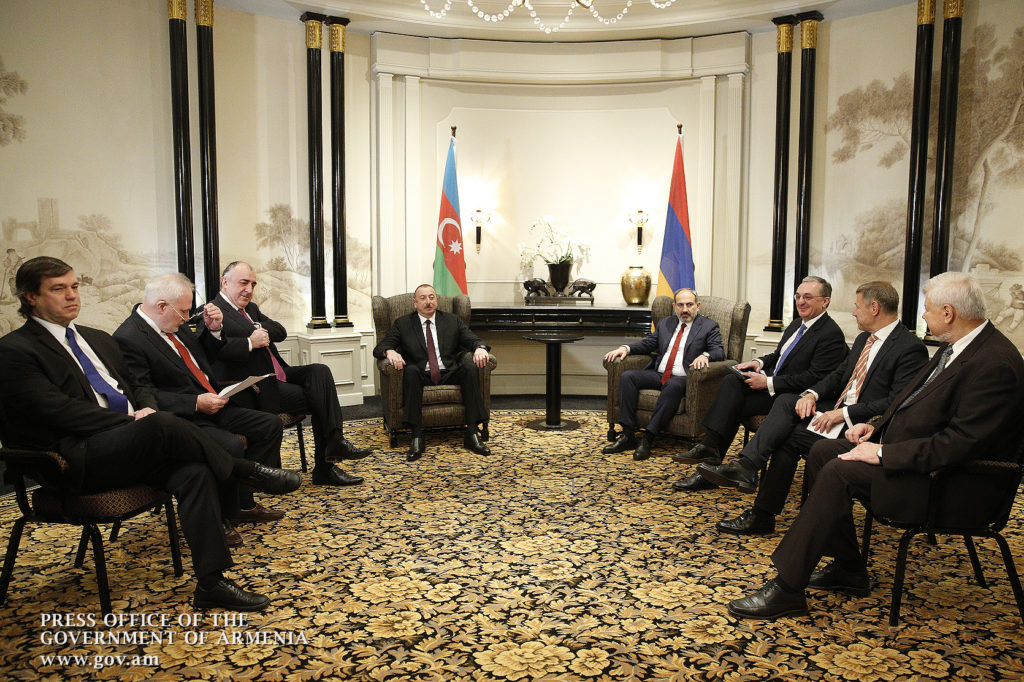
VIENNA, Austria—Armenian Prime Minister Nikol Pashinyan and Azerbaijani President Ilham Aliyev have refreshed negotiations in the Nagorno-Karabakh conflict after their highly anticipated, first official one-on-one meeting last week.
The two leaders met for two hours in private, followed by consultations with American, French and Russian diplomats from the Organization for Security and Cooperation in Europe (OSCE Minsk Group). The three states are part of an initiative tasked with the mission to find a peaceful resolution between the two parties. Pashinyan and Aliyev had previously met on the sidelines of the World Economic Forum in Davos for what officials had called “unofficial talks.” They have also held brief conversations in Dushanbe and Saint Petersburg.
According to a statement issued by representatives of the Minsk Group, “the meeting took place in a positive and constructive atmosphere and provided an opportunity for the two leaders to clarify their respective positions.” The two leaders apparently agreed to strengthen the ceasefire measures on the front lines and do more to cooperate on humanitarian questions in the area around the Line of Contact.
While there were no monumental developments, Pashinyan does seem relatively satisfied with the initial steps. “I cannot say that there has been a breakthrough in the negotiation process, a revolution, a turning point or event, but it is important that a process has started, which allows us to speak about our agenda, ideas, concerns and talk about the process I referred to in Stepanakert and later on during my press conference” he said.
He did, however, stress that his positive assessment of the meeting should not be misconstrued as a victory or defeat for either party. In his view, the encounter had a modest goal: to reinvigorate a stalled negotiation process. “A dialogue is underway, and each side has its own ideas,” said Pashinyan. “The conflict is deeply rooted, and we need to state that we do not deal with a simple situation.”
The office of the Azeri president, by contrast, issued a short and cryptic press release acknowledging that the meeting took place. No further information was provided. President Aliyev, for his part, expressed hope in the renewed negotiation process in an interview with Russian state-owned TASS news agency. He did hint at a small victory for successfully blocking representatives of the Nagorno-Karabakh Republic (Artsakh) from negotiations, in keeping with the format in place since 1998.
In March, Pashinyan outraged Baku when he told a panel at the Council of Europe that he could not negotiate on Artsakh’s behalf, calling for Stepanakert’s reintegration into the process. On April 1, the Prime Minister took to Facebook Live to express his continued belief that the unrecognized state would be readmitted to the negotiating table. According to Pashinyan, Armenia and Azerbaijan could not fully prepare their societies for peace without the input of the people of Artsakh. “Will it be a loss for Azerbaijan, if Nagorno Karabakh joins the negotiations? No, of course, not” he told viewers.
Last year’s Velvet Revolution sparked a renewed interest in the Karabakh conflict resolution process from both local and foreign observers. The most recent parliamentary election has given the new Prime Minister a legitimate popular mandate to lead negotiations on the issue. Commentators had previously suggested that the lack of public consultation or approval under the Sarkisian administration hampered any real breakthrough in negotiations. Back in 2016, one of the gunmen in the opposition group Sasna Tsrer that stormed the Erebuni police department, said they were partly motivated by a rumor that Sarkisian was preparing to return some of the districts surrounding the Soviet-era borders of the Nagorno-Karabakh Autonomous Oblast to Azerbaijan.
Every round of negotiations between Armenia and Azerbaijan has included proposals for some form of land-for-status arrangement. This proposal, which led to the downfall of Armenia’s first president, Levon Ter-Petrossian, would be brought up by his successor, Robert Kocharyan at a 2001 meeting with his Azeri counterpart in Key West, Florida. Further negotiations led to the 2002 Prague Process, which would see the return of five of the seven districts to Azerbaijan. This proposition would again appear in the 2006 Madrid Principles, which currently forms the basis for negotiations between the parties.
The notion that Armenia would abandon hard-fought territory as well as the lack of clarity on Artsakh’s status as described in the Madrid Principles is considered unacceptable by many in Armenia and the Diaspora. By contrast, Baku has taken a maximalist stance on the subject of Artsakh’s independence, rejecting the matter outright. This deadlock has stalled any progress in negotiations and rendered any significant breakthrough impossible.
Political organizations in Armenia and the Diaspora have been concerned about recent signs of movement away from the current status-quo under Pashinyan’s administration that a land-for-status deal might still be on the table. Some have expressed doubt on Baku’s commitment to abide by the rules of any negotiated settlement over the territory. On the day of the Pashinyan-Aliyev meeting, Aram Hamparian, Executive Director of the Armenian National Committee of America (ANCA) wrote on Facebook: “Does anyone actually believe that Artsakh surrendering vast areas of its sovereign territory will somehow make Artsakh more secure or Azerbaijan less aggressive?”
The issue has also been taken up by other government officials. Armenian Defense Minister David Tonoyan, speaking to a crowd in New York by coincidence on the same day as the Vienna summit said “I declare that the formula ‘territories for peace’ will no longer exist, and we will reformulate it as ‘new war – new territories,’”. Pashinyan had previously gone on record rejecting the concept.
Though this first official meeting has not led to any significant breakthrough, observers agree that it might start a new process for the parties to lay the groundwork for an eventual normalization of relations. The Armenian government has recently committed itself to taking the necessary measures to “prepare [Armenian] society for peace.” Azerbaijan has yet to reciprocate.
Author information
The post Pashinyan-Aliyev Meeting: Positive, but Inconclusive appeared first on The Armenian Weekly.